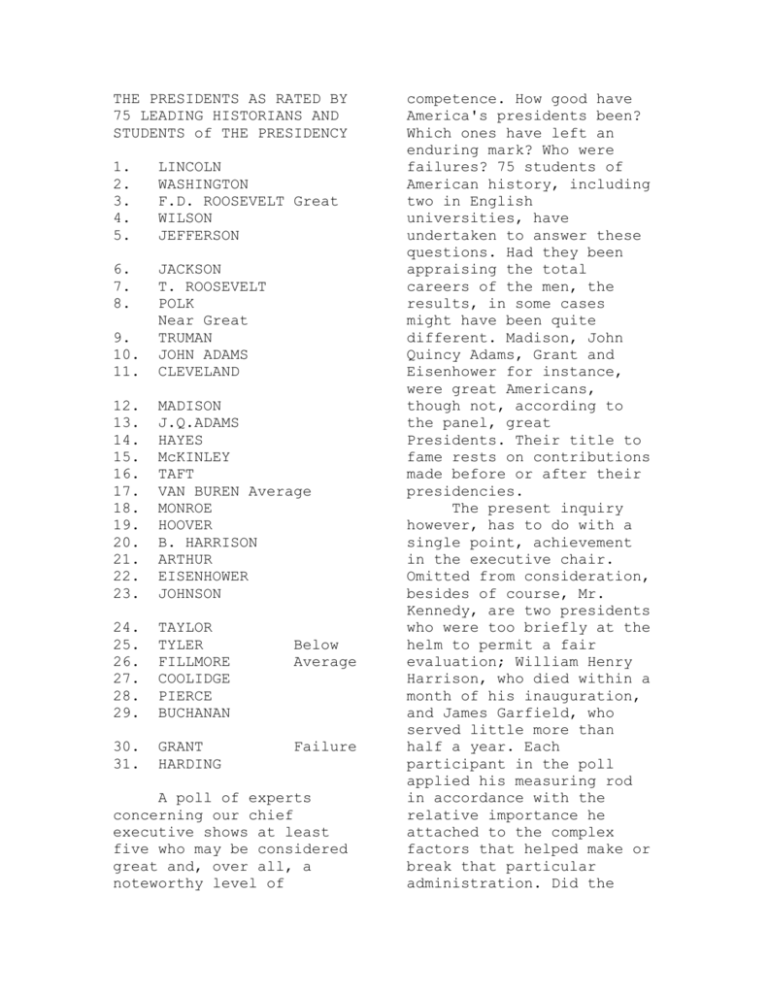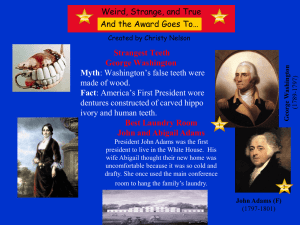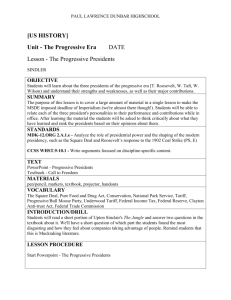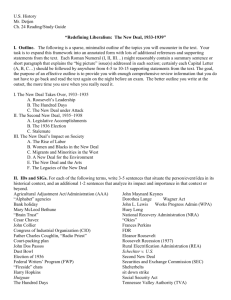THE PRESIDENTS AS RATED BY 75 LEADING HISTORIANS AND
advertisement

THE PRESIDENTS AS RATED BY 75 LEADING HISTORIANS AND STUDENTS of THE PRESIDENCY 1. 2. 3. 4. 5. LINCOLN WASHINGTON F.D. ROOSEVELT Great WILSON JEFFERSON 6. 7. 8. 9. 10. 11. JACKSON T. ROOSEVELT POLK Near Great TRUMAN JOHN ADAMS CLEVELAND 12. 13. 14. 15. 16. 17. 18. 19. 20. 21. 22. 23. MADISON J.Q.ADAMS HAYES McKINLEY TAFT VAN BUREN Average MONROE HOOVER B. HARRISON ARTHUR EISENHOWER JOHNSON 24. 25. 26. 27. 28. 29. TAYLOR TYLER FILLMORE COOLIDGE PIERCE BUCHANAN 30. 31. GRANT HARDING Below Average Failure A poll of experts concerning our chief executive shows at least five who may be considered great and, over all, a noteworthy level of competence. How good have America's presidents been? Which ones have left an enduring mark? Who were failures? 75 students of American history, including two in English universities, have undertaken to answer these questions. Had they been appraising the total careers of the men, the results, in some cases might have been quite different. Madison, John Quincy Adams, Grant and Eisenhower for instance, were great Americans, though not, according to the panel, great Presidents. Their title to fame rests on contributions made before or after their presidencies. The present inquiry however, has to do with a single point, achievement in the executive chair. Omitted from consideration, besides of course, Mr. Kennedy, are two presidents who were too briefly at the helm to permit a fair evaluation; William Henry Harrison, who died within a month of his inauguration, and James Garfield, who served little more than half a year. Each participant in the poll applied his measuring rod in accordance with the relative importance he attached to the complex factors that helped make or break that particular administration. Did the president head the nation in sunny or stormy times? Did he exhibit a creative approach to the problems of statecraft? Was he the master or servant of events? Did he use the prestige and potential of the position to advance the public welfare? Did he effectively staff key government posts? Did he properly safeguard the country's interests in relation to the rest of the world? How significantly did he affect the future destinies of the nation? Admittedly, the judgment of the historian is not necessarily the judgment of history, but it is the best we can have without waiting for the sifting process of time. The members of the panel agreed with little dissent on the great and near great, and, at the opposite extreme, on those who made the poorest records. The principle differences involved the comparative ranking of the presidents regarded as average and of those below average but riot failures. Even in these cases, the preponderance of opinion was conclusive. Lincoln, Washington, F. Roosevelt, Wilson and Jefferson received the accolade of greatness in the order given. The reasons for their preeminence will be given later, but since the inclusion of Roosevelt may surprise persons still smarting from memories of New Deal times, it should be noted that his place reaffirms the view of fifty five historians, most of them overlapping on the present panel , whose findings were published in 1948. The longer perspective adds weight to the previous judgment. After the top group came the half-dozen figures who, while eclipsing the majority of White House residents, yet fail 1 of the foremost rating. Beginning with Jackson and Theodore Roosevelt, the near great presidents continue with Polk, Truman, John Adams and Cleveland and. Old Hickory marked the advent of the common man to national power and in particular distinguished himself by defeating South Carolina's attempt at nullification and by destroying the monopolistic second United States Bank. The 1948 poll indeed placed him among the great presidents, but the present one, by a narrow margin, lowers him one degree. Theodore Roosevelt, responding to similar impulses, taught the electorate the danger to the pubic wealth of consolidated business. Against entrenched opposition, he instituted a program of federal regulation and conservation of natural resources. Polk, for his part, extended the national boundaries until they embraced what is now the great southwest and all the country lying between the Rocky Mountains and the Pacific Ocean. Added to Jefferson's Louisiana Purchase, these accessions from Mexico and England gave the United States its continental breadth. Though Polk's conduct toward Mexico violated international ethics, it is noteworthy that his critics, neither then nor later, have ever proposed that the conquests be returned. Truman, the only one in the near Great class still with us, discharged impressively the awesome obligations revolving on the U.S. as the leader of the free world in the cold war with Soviet imperialism. The Truman Doctrine for the protection of Greece and Turkey, the Marshall Plan for the restoration of Western Europe, the Berlin Airlift, the Point Four program for backward countries, NATO, our first peacetime military alliance, and the intervention in Korea in support of the United Nations, all these constituted landmarks in an assumption of global responsibilities undreamed of only a few years before. Of the last two in the near great group, the case for John Adams rests primarily on his successful resistance to his party's demand for changing a limited conflict with France into an allout war, while the inclusion of Cleveland recognizes his stubborn championship of tariff reform and honesty and efficiency in the civil service. There follow more than a third of the presidents who fall in the average or mediocre class. By and large these twelve believed in negative government, in self subordination of the executive to the Legislative power . They were content to let well enough alone or, when not, were unwilling to fight for their programs or inert at doing so. In descending scale they are Madison, John Quincy Adams, Hayes, McKinley, Taft, Van Buren, Monroe, Hoover, Benjamin Harrison, Arthur, Eisenhower and Johnson. Johnson is the principle exception to the passive role, but his prolonged con test with Congress over Southern reconstruction brought him the ignomity of impeachment and a narrow escape from dismissal from office. Eisenhower, the most recent and consequently the hardest of the Presidents to evaluate, received a few votes in the near Great category, but many more for below average and failure. A two thirds majority placed him toward the bottom of the average category. Of the executives of still less stature, 6 of the 8 qualify as below average; Taylor, Tyler, Fillmore, Pierce and Buchanan in that order. By ill chance, Pierce and Buchanan headed the government in the years of haunting crisis which brought on the Civil War. Had more statesmanlike hands directed affairs, that tragic failure of the democratic process might have been avoided. A sizable number of historians rated the two as failures. The verdict of total unfitness was reserved by overwhelming majority for Grant and Harding alone. Both were postwar presidents who, by their moral obtuseness, promoted a low tone in official life, conducting administrations scarred with shame and corruption. Under Grant the wrongdoing reached as high as his private secretary, the Postmaster General and the Secretaries of War and Treasury. In Harding's case, three members of his cabinet were forced to resign for like reasons. One of them went to prison along with several other important executive officials. Harding, who could not plead Grant's political inexperience, worked intimately with the notorious Ohio Gang which had accompanied him to Washington. His belated qualms at betraying the public interest probably helped to bring on his death after 2.5 years in the White House. A comparison of the findings of the 75 historians in 1962 with those of the 55 in 1948 shows no significant changes except for the reduction of Jackson to near great. Otherwise the choices in the of five major classes. hold good, though the earlier survey, of course, necessarily omitted Truman and Eisenhower. Within each of the intermediate categories there is some rearrangement of the order, notably the lowering somewhat of the positions of Cleveland, Monroe and Coolidge and the upgrading, of Polk, Madison and McKinley. What qualities and achievements elevated of five Presidents over all their fellows? Was there a pattern of greatness which distinguished these men who otherwise varied so widely in education, personality and political style and nature, direction and permanent effect of their accomplishments. A quick review will reveal the common elements. First, each held the stage at a critical moment in American history and achieved timeless results. Washington converted the paper Constitution into a practical and enduring instrument of government. Jefferson expanded the original area of the U.S. from the Mississippi to the Rockies. Lincoln saved the Union from internal destruction. Roosevelt tightened the restraints on big business and finance and preserved the country in the face of i ts worst depress on, then marshaled its resources for victory in World War II effected profound domestic changes peaceably within the democratic framework, revolutions by popular consent. By the same token, each president took the side of progress and the general welfare against the status quo. Washington, to be sure, today seems a staid conservative to persons forgetful of his historical context. In truth, however, the director of a people's war of emancipation from colonialism did devote all his prestige and ability as their civilian head to justify the daring new republican model of government," the fate of which, he told his countrymen, was "deeply staked on the experiment entrusted in the hands of the American people." Jefferson, standing on Washington's shoulders, widened the concept of popular rule by word and example, and in acquiring the vast trans Mississippi domain, he sought, among other things, to check the growing power of Eastern business interests with an expanding agrarian west. Lincoln, given no choice in the matter, settled on the battlefield the question of "whether, in a free government, the minority have the right to break up the government whenever they choose," and while doing so he advanced the cause of human rights by outlawing the anachronism of slavery. In our own century The New Freedom of Wilson and The New Deal of Roosevelt have, in turn, enlarged momentously the Government's responsibility for the social and economic well being of its citizens. These towering of figures, moreover, acted most fully and farsightedly in foreign affairs. All cared profoundly about keeping the country out of war, though over the year.---. circumstances beyond American control necessitated differences as to means. When the republic was young and craved time to build up its strength, Washington instituted and Jefferson perfected, a policy of isolation or neutralism toward the chronic power struggles embroiling Europe; and Lincoln, in the dark days of the Civil War, averted, through consummate diplomacy, the calamity of British intervention on behalf of the Confederacy. As America came of age the situation changed. As Washington had foretold in his "Farewell Address," the United States could now command of its own fortunes"; and the shrinkage of global distances plus the modern weaponry of destruction obliged a departure from the past. The goal of peace remained unaltered, but the method devised by Wilson and Roosevelt to achieve it was through an international structure for collective security. Under this sign, Wilson pioneered the League of Nations; and Roosevelt, succeeding where Wilson had failed in winning Senatorial approval, helped reshape that body into the more potent United Nations. The members of this group were not only constructive statesman but realistic politicians. Washington apart, none of them waited for the office to seek the man, they pursued it with all their might. Upon winning it, they functioned as chiefs of their parties as well as chiefs of state. Washington it is true , as the first to occupy the position, endeavored to shun political ties; he even appointed the contending party leaders, Jefferson and Hamilton, to his Cabinet, but, taught by experience he presently abandoned his nonpartisanship as sort of political suicide." His successors followed his course from the outset. The arts of the politician were, of course, indispensable to gain the needed Congressional support for their policies. With unconvinced members they knew when to reason and to browbeat, to bargain and stand firm, to concede what was relatively unimportant in order to obtain what was essential . If occasion demanded, they used such means as bestowing or withholding Federal patronage, employing or threatening to employ the veto and, when all else failed, appealed over the heads of the lawmakers to the American people. Every one of these men left the executive branch stronger and more influential than when he found it. As a matter of course they magnified the power expressly granted them by the Constitution and assumed other power not of the document. The people had always intended that their Chief Executive be equal to the widening needs of society. Inevitably, these Presidents encountered trouble with the Supreme Court, for its members enjoy lifetime tenure of office and, moreover, restrained by that tribunal 5 past decisions, tended to speak for times gone by. Only Washington, the one President to name the entire body, escaped that dilemma. Jefferson, alarmed lest the Judiciary he had inherited from the political opposition would "strike down all the works of republicanism," got Congress to abolish a series of lower judgeships which the outgoing administration had prepared for its adherents, and he induced the House to impeach a grossly partisan member of the Supreme Court. Had the attempt at ouster succeeded, Chief Justice John Marshall would almost certainly been the next quarry. Over and over again Lincoln, under plea of military necessity, ignored or defied judicial decree. On one occasion he even disregarded a writ of habeus corpus from Chief Justice Taney himself. Wilson, though managing to avoid open strife, nonetheless viewed the Court's conservative bent as the nation's "most obvious and immediate danger." And Franklin Roosevelt, when thwarted by the high bench in expanding his New Deal program, sought to correct its "horse and buggy" mentality by the addition of younger and more progressive Justices. Congress did not consent, but the tribunal in alarm, hastily changed its attitude. In all these affairs, moreover, the verdict of time has upheld the Presidents' underlying purposes, if not always their methods. Being strong executives, the five also offended vested economic interests and long-standing popular prejudice. Furthermore their sins of commission and omission, though small in the long view of history, looked enormous to critical contemporaries. Each in turn, met with charges of subverting the Constitution, of lusting to be king of dictator, and of knuckling under on occasion to some foreign power. The "arrows of malevolence" so wounded Washington that he exclaimed to a friend that he "had never repented but once having slipped the moment of resigning his office, and that was every moment since." Jefferson was pelted with such epithets as "Mad Tom, A "Contemptible Hypocrite," "a man without religion ," and "a ravening Wolf". Lincoln suffered abuse, even from Northerners, as "the baboon in the White House ," a usurper," and "a perjured traitor. " He said it was in his heart to pity Satan if to be head of Hell is as hard as what I have to undergo." Wilson and Roosevelt, as many will still remember, came off no better, both being reviled for wanton personal ambition and seeking to rule or ruin. In the case of each of the greats, the press added fuel to the flames when, indeed, it did not start them. Yet, notwithstanding all the sound and fury, these presidents were more deeply loved than they were hated. The rank and file of Americans reelected every one of them to a second term and Roosevelt to a third AND a fourth. Another factor marking this group was that, but for the self made Lincoln, they came from the upper level of society (and even Lincoln, before reaching the White House, had riser from humble beginnings to be a leader of the Illinois bar). This willingness of the voter to accept upper level leadership sheds an interesting light on the kind of value and human advantages traditional to a rural way of life. Wilson, growing up in a highly cultured but riot affluent atmosphere, arrived pretty much the same outlook on the basis of extensive reading. But, superior though these personages were, only two, Washington and Wilson, excelled as administrators. The rest either lacked the ability or else believed the ends of public policy more important than the machinery for achieving them. On balance, moreover, their inattention served to unfreeze official routine and inject vitality and a readiness to innovate into the Government ranks. Franklin Roosevelt in fact went so far as to declare, "The presidency is riot merely an administrative office. That is the least of it." If he overstated the matter, all the others would have heartily endorsed his further view: "It is preeminently a place of moral leadership." Moral leadership meant a commitment to maintain and transmit to future generations the liberal and humane ideals of the past. It involved the capacity to fit the rational purpose to the constantly changing requirements of a dynamic people. In brief, the foremost Presidents possessed a profound sense of history, a recited dedication to timesanctioned principles which each, in his. own day and way, succeeded in reinvigorating and extending. Essential as it was to win approval at the polls, they looked as well to the regard of posterity. James Bryce in his book,The American Commonwealth, entitled a famous chapter, "Why Great Men Are Not Chosen President;" but he erred even for those years. Taking the entire span from Washington to Eisenhower, the historical consultants find that great men occupied the chair in 40 of the 172 years and, if the near-great associates are added, the grand total approaches 80 years, or nearly half the lifetime of the Republic. Can any other nations display a better record? Moreover, even the donothing stretches in the White House did not lack value, since as a rule they provided breathing spells for the country to digest the achievements of the more forceful executives. All in all, the historical picture offers the present day defenders of democracy against totalitariarism reassuring evidence that Jefferson's,and America's, reliance on the people as "the safest depository of power" as the cure for mankind's ills. "Evaluation of Presidential Greatness" From a survey of 846 historians nationwide, complied by Robert K. Murray and Tim H. Blessing (Penn State) as appears in Time (December 19,1983) Updated by the authors in April, 1991. 19. 20. 21. 22. 23. 24. 25. 26. William Taft Martin Van Buren Herbert Hoover Rutherford Hayes Chester Arthur Gerald Ford Jimmy Carter Benjamin Harrison Below Average 27. Zachary Taylor 28. Ronald Reagan 29. John Tyler 30. Millard Filmore 31. Calvin Coolidge 32. Franklin Pierce Great 1. Abraham Lincoln 2. Franklin Roosevelt 3. George Washington 4. Thomas Jefferson Near 5. 6. 7. 8. Great Theodore Roosevelt Woodrow Wilson Andrew Jackson Harry Truman Above Average John Adams Lyndon Johnson Dwight Eisenhower James Polk John Kennedy 14. James Madison 15. James Monroe 16. John Quincy Adams 17. Grover Cleveland Average 18. William McKinley Failures 33. Andrew Johnson 34. James Buchanan 35. Richard Nixon 36. Ulysses Grant 37. Warren Harding Unranked because they were not in office long enough to evaluate William Harrison James Garfield







